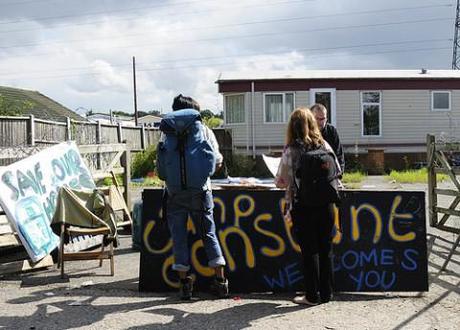
Dale Farm, the traveller’s camp, is being forcibly evicted. It has taken 10 years, and £18 million pounds as a legal battle between Irish travellers and the council now ends with riot police and burning caravans. Some of the activists in support of the travellers have claimed that this is “ethnic cleansing“. Bailiffs are waiting outside, reports the BBC, and at the time of writing, six protestors are still chained to the railings. Riot police are present.
So is the eviction of the Dale Farm travellers necessary, or not? Commentators are almost overwhelmingly in support of the forced eviction – but for differring reasons. A dissenting voice comes from a gypsy.
“I have nowhere to go, but I was scared by the violence and am worried for my children. As soon as the gate opens I want to leave,” said Dale Farm resident Mary Sheridan, quoted on the BBC.
Think about humanity. Roxy Freeman, herself a gypsy child, had a heavy heart writing in The Guardian’s Comment is Free. The law isn’t “black and white” – the travellers have been “let down by the system.” Writing from a caravan (parked legally), she recalls her fear and confusion at the countless evictions of her childhood. It doesn’t matter how well-behaved you are, “if you live in a caravan you are scum in the eyes of most of the British population.” The people evicted have nowhere to go – what about human compassion?
The activists are the problem. You’re half right, said Ed West in The Daily Telegraph. He’s got no beef with the travellers, but he can’t see the point of their outdated way of life. But reclassifying travellers as an ethnic group (despite the fact that it’s not their ethnicity that defines them) has meant that the Human Rights brigade step in to “an Essex planning disupte.” They’re not an ethnic group – they’re descendants of labourers, now with nowhere to go, but that doesn’t mean they are outside the law. It’s the activists, who want the travellers to remain an underclass, who are “the real villains.”
There are other issues which won’t go away. It’s true, said the leader in The Independent. The travellers have been offered social housing, but rejected it; if they stayed, it would mean that planning laws everywhere would be challenged. But the problem remains – how to reconcile an “itinerant minority” with the interests of the “settled majority”? Perhaps more legal sites would be a start.
The travellers face a stark choice. We agree, argued The Times. Facts about the travellers are shocking. Seven out of ten die before they’re 65; one in three before 25. “Theirs is an absurd and ugly way to live.” They’re not being evicted because of their ethnicity – they’re breaking planning laws. Half of the site has permission, anyway – those “self-styled protesters” who’ve chained themselves to the rails are exercising “self-indulgent ignorance.” Of course we ought to be sympathetic – families have lived there for years – but eventually, the law will catch up with you if you’re somewhere you’re not meant to be. The community gains nothing from its self-imposed isolation – recent reports of slavery in traveller’s communities point to moral degradation. This doesn’t make anyone happy – and though we ought not to persecute, as has happened to other Gypsies in Europe, it will, in the end, be the travellers who “suffer most” by trying to live outside the rule of law.

